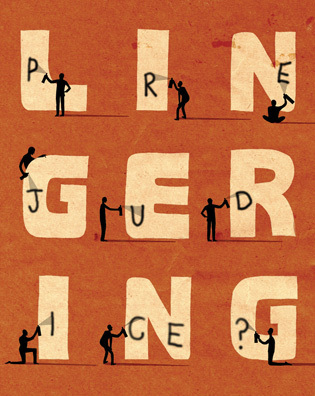 loading
loading
Light & VerityHate speech and free speech Adam SimpsonView full imageThe words "nigger school" spray-painted on a Pierson College wall, and "drama fags" on the University Theatre. Students costumed in blackface for Halloween. Fraternity brothers posing for a photo with a sign saying "We Love Yale Sluts." A swastika, in snow, swabbed onto a tree trunk on the Old Campus. An unusual spate of degrading speech and expression broke out on campus over the past year, causing the university to ask itself whether such acts are thoughtless pranks or signs of lingering prejudice. The incidents have roused the attention of administrators and activists alike, and student groups are clamoring for new university action to address hate speech. After an earlier string of incidents last year, students from Yale's ethnic cultural houses and several other groups on campus banded together to form an umbrella organization called the Coalition for Campus Unity, or CCU. The group reached out to administrators to discuss the incidents, resulting in a new requirement for incoming freshmen to read Beverly Tatum's book Why Are All the Black Kids Sitting Together in the Cafeteria? and to participate in discussions about racial sensitivity. Yale College dean of student affairs Marichal Gentry says the college plans to set up an Intercultural Affairs Council (IAC) that will promote awareness of the need for intercultural sensitivity. In addition, over the past year, the Graduate School and the college dean's office organized four public faculty-led panel discussions on the history, politics, sociology, and psychology of hate. CCU has also proposed a new grievance board that would hear complaints about offensive speech. CCU member Robert Szykowny ’08 says students currently don't know where to go for help, and "people are intimidated." Gentry says the IAC planners are considering the CCU proposal, but he adds that the college has existing student complaint procedures for cases of harassment or discrimination. He says the IAC will help promote awareness of the existing grievance policy. But Yale has not indicated that it will back away from the Woodward Report, a 1975 document on free expression that was adopted as official university policy. That report defends "the right to think the unthinkable, discuss the unmentionable, and challenge the unchallengeable." Meanwhile, the campus is left wondering why the number of such incidents has climbed over the past year or two. No one has a conclusive explanation, though Marianne LaFrance, a professor of psychology and women's and gender studies who spoke on one of the four panels about hate, suggests that the rash of recent incidents may be part of a copycat pattern encouraged by the "hothouse atmosphere" of a college campus. She notes that, even if they were intended as jokes, such incidents can have serious effects on members of the target groups. And "one of the best ways to actually quiet or silence people who have been hurt or ridiculed by humor is to say, 'Oh please, it was just a joke.'" This explanation rings true to CCU member Thomas Meyer ’11, who says that as a freshman, he has been surprised by the volume of offensive incidents over the past year. "I think part of it is the very fact that this campus is considered so liberal, so tolerant," Meyer says. "They're not constantly thinking of Yale as a place where bigotry happens. So doing something like that might seem okay -- might seem funny, at the time."
The comment period has expired.
|
|